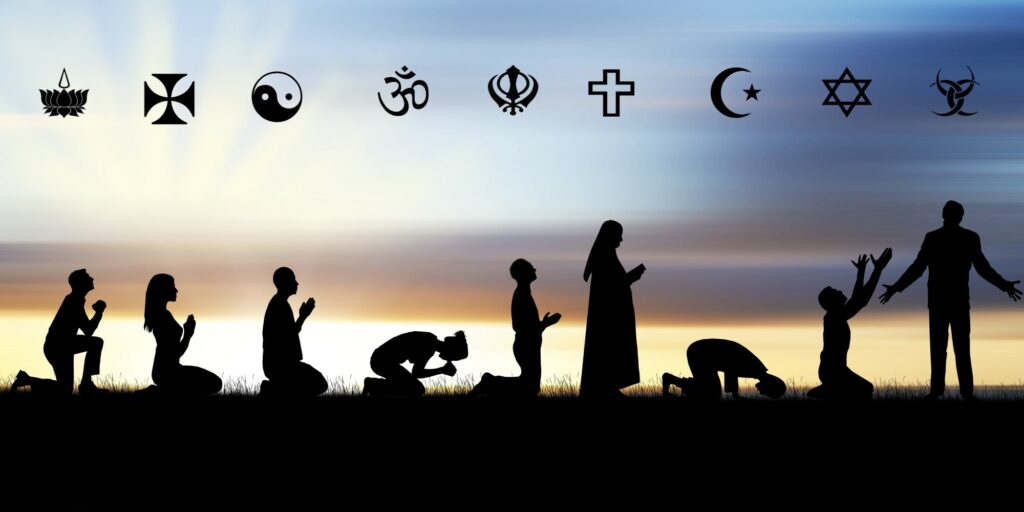Introduction
Religion has been a cornerstone of human civilization for millennia, shaping beliefs, guiding moral values, and providing a framework for spiritual and existential questions. In this article, we delve into the profound world of religion, exploring its diverse manifestations, the role it plays in people’s lives, and the significance it holds within societies across the globe.

Understanding Religion
Religion encompasses a broad range of beliefs, practices, rituals, and moral codes that revolve around the existence of a higher power or powers. It provides a framework for understanding the world, defining morality, and seeking spiritual connection and meaning. Religion often involves organized systems of worship, sacred texts, and communal gatherings that serve as avenues for spiritual growth and community engagement.
Major World Religions
Christianity
Christianity is one of the largest and most influential religions globally. It is centered around the life, teachings, death, and resurrection of Jesus Christ as documented in the Bible. Christian worship takes place in churches, and believers engage in practices such as prayer, sacraments (e.g., baptism and communion), and acts of charity. Denominations within Christianity include Catholicism, Protestantism, and Eastern Orthodoxy.
Islam
Islam is the second-largest religion globally, founded by the Prophet Muhammad in the 7th century CE. Its followers, Muslims, believe in the teachings of the Quran, which they consider the word of Allah (God). Muslims observe the Five Pillars of Islam, including the declaration of faith, prayer, fasting during Ramadan, giving to the poor, and the pilgrimage to Mecca (Hajj).
Hinduism
Hinduism is one of the oldest religions, originating in the Indian subcontinent. It is a diverse and complex belief system with various deities and philosophical concepts. Hindu worship often takes place in temples, and followers engage in rituals, meditation, yoga, and acts of devotion. The pursuit of spiritual enlightenment and the concept of karma are central to Hinduism.
Buddhism
Buddhism, founded by Siddhartha Gautama (Buddha), originated in ancient India and has spread across many parts of Asia. It emphasizes the alleviation of suffering and the pursuit of enlightenment. Buddhist teachings revolve around the Four Noble Truths and the Eightfold Path. Meditation, mindfulness, and ethical living are integral to Buddhist practice.
Sikhism
Sikhism emerged in the 15th century in the Punjab region of South Asia. It promotes equality, social justice, and the belief in one God. Sikhs follow the teachings of the Guru Granth Sahib, their central religious scripture. The Five Ks, which include wearing the Kesh (uncut hair) and carrying a Kirpan (a ceremonial sword), are symbols of Sikh identity and devotion.
Judaism
Judaism is one of the oldest monotheistic religions, dating back over 3,000 years. It is rooted in the covenant between God and the Hebrew people, as outlined in the Torah (Jewish sacred texts). Jewish worship takes place in synagogues, and rituals include prayer, study of the Torah, observance of the Sabbath, and celebration of festivals such as Passover and Hanukkah.
Other Religions
In addition to the major world religions mentioned above, there are numerous other faith traditions with significant followings, such as Jainism, Bahá’í Faith, Confucianism, and Indigenous religions. Each of these religions has unique beliefs, practices, and cultural contexts that contribute to the rich tapestry of religious diversity worldwide.
Frequently Asked Questions (FAQs)
1. What is the purpose of religion?
Religion serves various purposes, including providing a framework for understanding the world, guiding moral values and ethics, offering comfort and solace in times of hardship, fostering a sense of community, and facilitating spiritual growth and connection with the divine.
2. Can a person follow multiple religions?
While it is uncommon to formally adhere to multiple religions simultaneously, some individuals may incorporate elements from different religious traditions into their personal beliefs and practices. This can vary greatly depending on cultural and individual factors.
3. Are all religions compatible with each other?
Religions differ in their beliefs, practices, and doctrines, and there are areas of disagreement among them. However, many religious traditions promote tolerance, respect, and understanding towards others, encouraging peaceful coexistence and dialogue among different faith communities.
4. How does religion influence society?
Religion has a profound impact on society, shaping values, moral frameworks, social norms, and cultural practices. It can provide a sense of identity and belonging, contribute to social cohesion, influence political ideologies, and inspire acts of compassion and social justice.
Conclusion
Religion, in its various forms, serves as a guidepost for human spirituality, moral values, and existential questions. It offers solace, fosters community, and provides a sense of purpose and meaning. As diverse as the human experience itself, religions contribute to the richness of our cultural heritage and play a significant role in shaping individuals, societies, and the world we inhabit.
============================================

